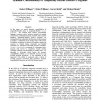Free Online Productivity Tools
i2Speak
i2Symbol
i2OCR
iTex2Img
iWeb2Print
iWeb2Shot
i2Type
iPdf2Split
iPdf2Merge
i2Bopomofo
i2Arabic
i2Style
i2Image
i2PDF
iLatex2Rtf
Sci2ools
139
click to vote
AIPS
2009
2009
Dynamic Controllability of Temporally-flexible Reactive Programs
In this paper we extend dynamic controllability of temporally-flexible plans to temporally-flexible reactive programs. We consider three reactive programming language constructs whose behavior depends on runtime observations; conditional execution, iteration, and exception handling. Temporally-flexible reactive programs are distinguished from temporally-flexible plans in that program execution is conditioned on the runtime state of the world. In addition, exceptions are thrown and caught at runtime in response to violated timing constraints, and handled exceptions are considered successful program executions. Dynamic controllability corresponds to a guarantee that a program will execute to completion, despite runtime constraint violations and uncertainty in runtime state. An algorithm is developed which frames the dynamic controllability problem as an AND/OR search tree over possible program executions. A key advantage of this approach is the ability to enumerate only a subset of poss...
AIPS 2009 | Artificial Intelligence | Dynamic Controllability | Program Executions | Temporally-flexible Reactive Programs |
Related Content
| Added | 08 Nov 2010 |
| Updated | 08 Nov 2010 |
| Type | Conference |
| Year | 2009 |
| Where | AIPS |
| Authors | Robert T. Effinger, Brian C. Williams, Gerard Kelly, Michael Sheehy |
Comments (0)

